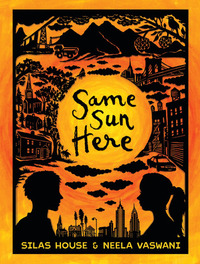Take a photo of a barcode or cover
adventurous
emotional
hopeful
informative
inspiring
lighthearted
reflective
relaxing
fast-paced
Plot or Character Driven:
Character
Strong character development:
Yes
Loveable characters:
Yes
Diverse cast of characters:
Yes
Flaws of characters a main focus:
No
challenging
emotional
funny
hopeful
slow-paced
Plot or Character Driven:
Character
Strong character development:
Yes
Loveable characters:
Yes
Diverse cast of characters:
Yes
Flaws of characters a main focus:
Yes
Two strong writers have put together a pleasant read from the fictional correspondence between dissimilar yet emotionally connected youngsters.
emotional
funny
hopeful
lighthearted
reflective
fast-paced
Plot or Character Driven:
Character
Same Sun Here is a beautiful book told entirely in letters between two pen pals. It deals with some heavy social justice themes, but does so without being too heavy-handed.
This is one of those special books that hovers over the line between middle grade and young adult.
I highly recommend the audiobook. Both authors narrate and Silas House has one of the most soothing voices I have ever listened to.
This is one of those special books that hovers over the line between middle grade and young adult.
I highly recommend the audiobook. Both authors narrate and Silas House has one of the most soothing voices I have ever listened to.
informative
inspiring
medium-paced
Plot or Character Driven:
A mix
Lovely. I listened on Audible and adored hearing the story in the authors’ voices.
emotional
funny
hopeful
inspiring
lighthearted
medium-paced
Plot or Character Driven:
Character
Strong character development:
Yes
Loveable characters:
Yes
Diverse cast of characters:
Yes
Flaws of characters a main focus:
Complicated
2-3 stars for the book, 3-4 stars for the audiobook.
I really enjoyed the audiobook version of Same Sun Here. The book was really brought alive in the recording, probably because the two authors voiced the characters' letter that they each wrote. I probably would've liked the book less if I hadn't listened to it (which is the opposite of what usually happens for me).
Although I found the book funny, endearing and a convincing portrayal of the experiences of two middle grade kids that manages to touch on topics that I don't usually see in j-fiction (fully realized immigrant experience of a non-brain drain Indian family, life of a smart kid in Appalachia, close family relationships), I felt like the authors laid it on pretty thick, even saying in so many words that what made the two main characters best friends was that they were so similar and yet so different from each other, living under the "same sun."
I also understand the criticisms of the book that it seems at times as if the authors were using the characters as mouthpieces for liberal views. It didn't start to sound excessive until about 2/3 of the way through the book, when it just started to get to be too much (too many mentions of voting for Obama, landlords trying to get rid of tenants in rent-controlled apartments, and anti-mountaintop-removal mining).
I really enjoyed the audiobook version of Same Sun Here. The book was really brought alive in the recording, probably because the two authors voiced the characters' letter that they each wrote. I probably would've liked the book less if I hadn't listened to it (which is the opposite of what usually happens for me).
Although I found the book funny, endearing and a convincing portrayal of the experiences of two middle grade kids that manages to touch on topics that I don't usually see in j-fiction (fully realized immigrant experience of a non-brain drain Indian family, life of a smart kid in Appalachia, close family relationships), I felt like the authors laid it on pretty thick, even saying in so many words that what made the two main characters best friends was that they were so similar and yet so different from each other, living under the "same sun."
I also understand the criticisms of the book that it seems at times as if the authors were using the characters as mouthpieces for liberal views. It didn't start to sound excessive until about 2/3 of the way through the book, when it just started to get to be too much (too many mentions of voting for Obama, landlords trying to get rid of tenants in rent-controlled apartments, and anti-mountaintop-removal mining).






